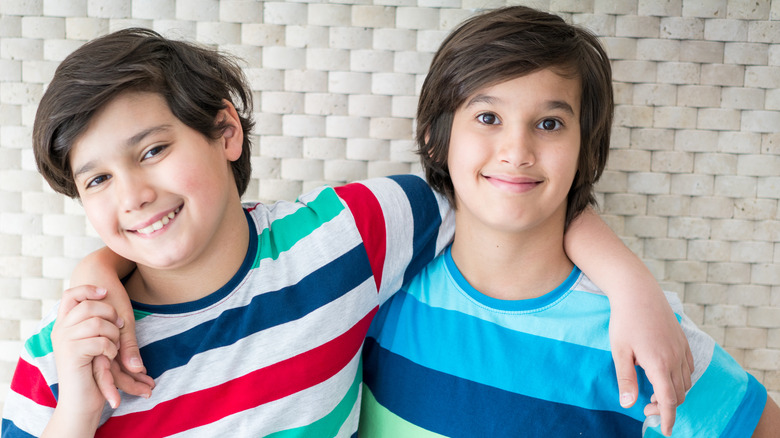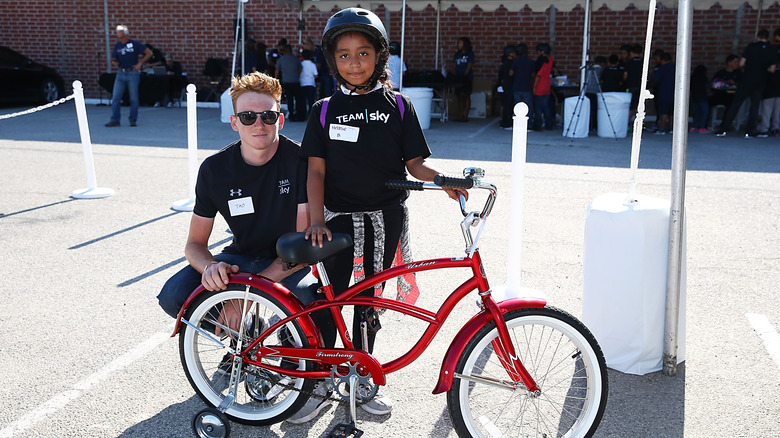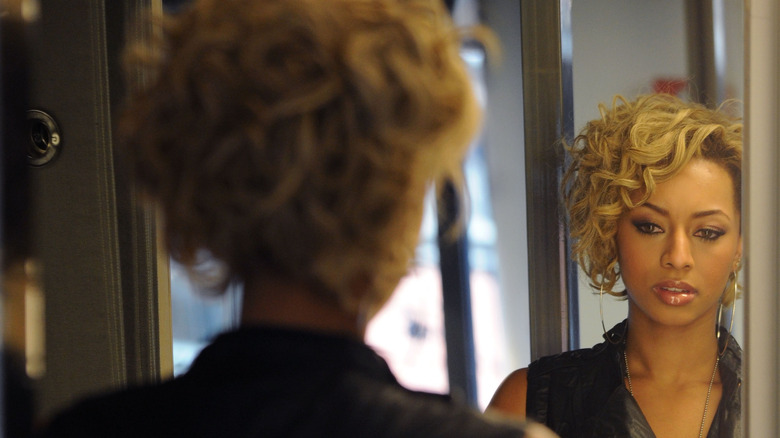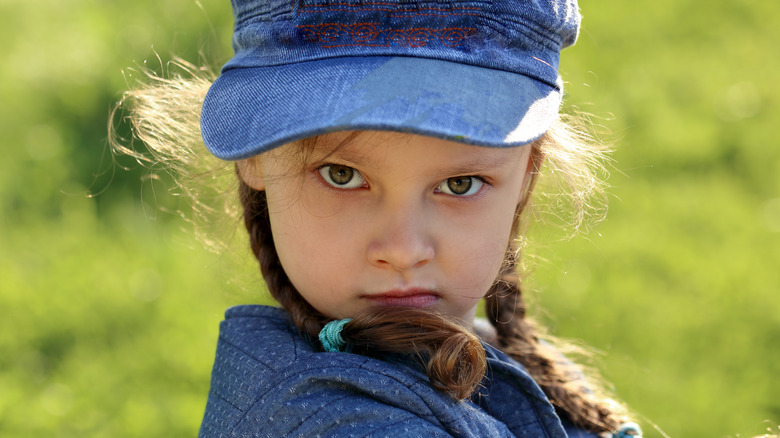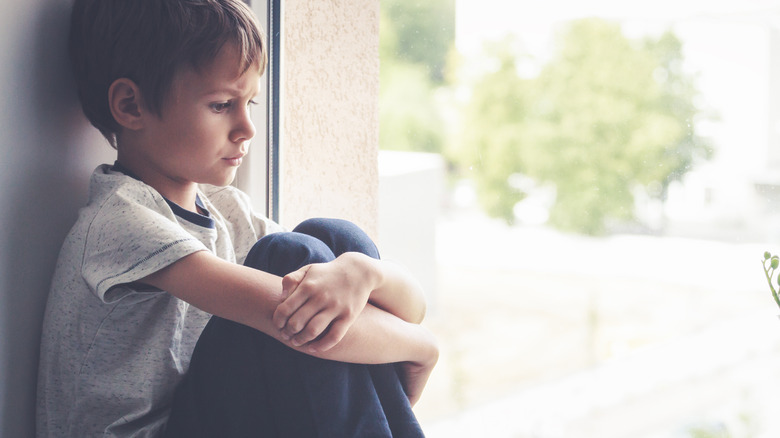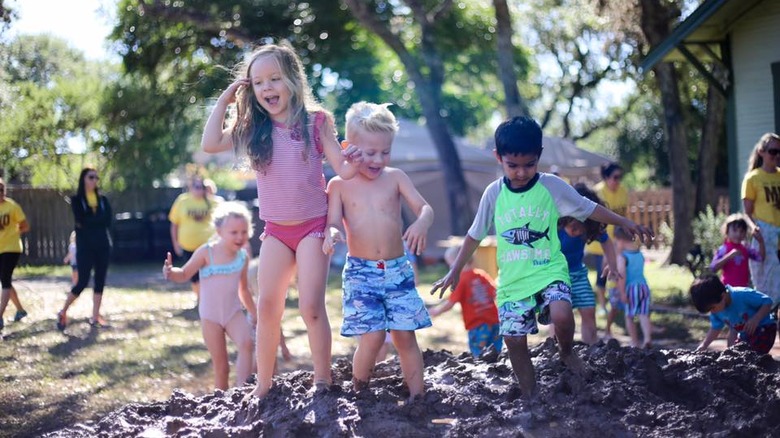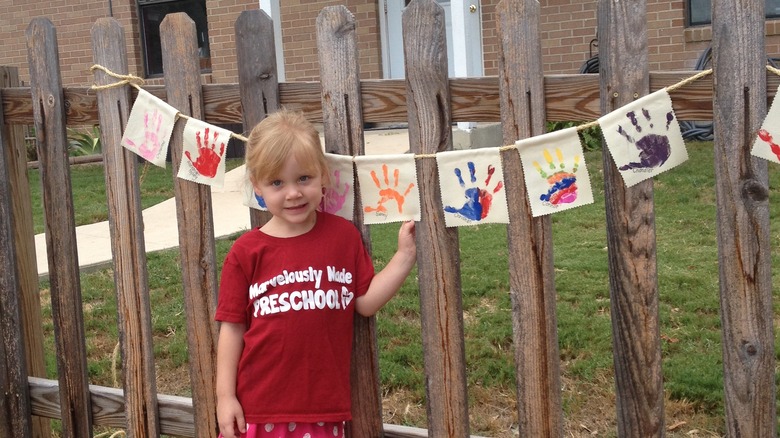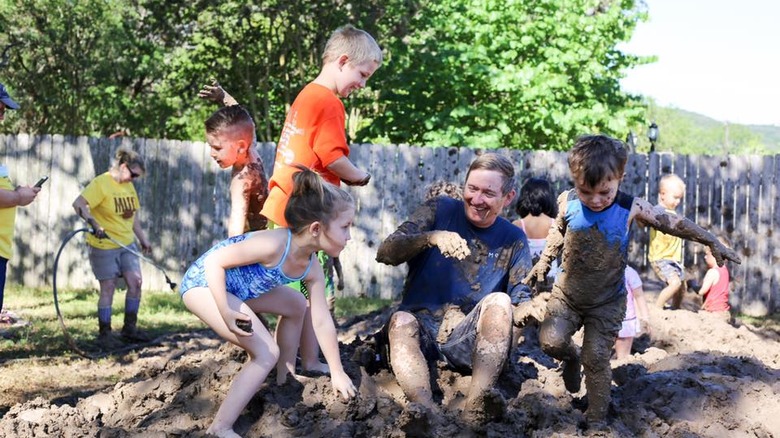Things You Should Say To Your Kids Every Day
Where are your shoes? Get in the car. Brush your teeth. Did you brush your teeth? Did you really brush your teeth? There are plenty of phrases that parents repeat to their kids on a daily basis to just get through the morning. But what should parents be saying to their children each day to get them through life?
We asked the professionals to weigh in on what phrases can make a difference in child development, and which are just mundane, innocuous phrases. They gave us their thoughts, and these are the things you should be saying to your child each day.
How are you?
Pediatric occupational therapist and parenting coach Brandi Russell said the best words parents can say to their children are in the form of a question. "Questions open doorways to conversations," she said. It lets children know you have an interest in who they are as people and leads them to independence. Simple questions like "How are you feeling?" help children identify their own desires and share their emotions, Russell said.
Questions can also build critical thinking skills. Parents today feel the need to solve all their children's problems, but questions can be empowering. When a child wails that they're thirsty, parents can empower that child by saying "Oh you're thirsty? Well what are you going to do?" That question lets the child know you have confidence in their ability to solve their own problem. If the child doesn't have a solution, parents can give instructions and respond with "I'll show you how to get your own water, so you'll know what to do next time you're thirsty."
You are kind
Melissa Divaris Thompson, a Manhattan-based psychotherapist, works with parents to undo a lot of the harm that was said to adults when they were children. She said sometimes just saying "You are kind" can make it a reality. Thompson said parents should make an effort to "catch" their kids doing something kind and acknowledge it. Telling a child that they are kind is a powerful way to help them grow into an emotionally healthy adult who internalizes that idea. And encouraging them to be kind to themselves will result in them being kind to others.
Please and thank you
Dr. John DeGarmo, one of the leading experts in parenting and foster care said in order to get respect you have to give respect. As a parent and a former high school teacher, the words "please" and "thank you" were a large part of his vocabulary. He said it's important to model behavior for children, and the best way to get them to say those words is for you to use them genuinely.
I'm sorry
This one might not come up daily, but your kids should hear you apologize when you mess up. Telling children "I'm sorry" shows them that even adults have to take responsibility for their actions, said pediatric specialist Alison Mitzner. Genuinely saying you're sorry when you lose your temper or make a mistake helps build trust.
Good try
Telling kids "great job" is fine if they've actually done a great job. But empty praise keeps kids from find meaning in their efforts. Acknowledging when they've worked hard will go farther, said Lynn Zakeri, a mother and clinical therapist. And praises for one child may not be fulfilling for another. Meeting children where they are, and assessing their individual needs is the best approach to praise.
Another tip Zakeri gives is to talk to children while walking the dog or driving together in the car. Sometimes making eye contact is too intimidating for kids. Taking away that intimidation will get kids to feel less judgement, and encourage them to open up more.
I like it when you...
New York therapist, Kimberly Hershenson, said parents should point out concrete examples of their children's behavior, talents, kindness and character each day. Saying things like "I like it when you're nice to your brother" or "I like it when you help me" brings positive attention to children and reinforces good behavior.
New York-based LMFT, Meredith Silversmith, said parents should attempt to acknowledge something their kids did right each day. It's much easier to criticize kids on what they're doing wrong. But even finding something small that they did right can make all the difference in how a child feels about themselves, Silversmith said.
How was your day?
Parents do a lot of talking, but sometimes the best thing we can say to our kids is nothing at all. Instead ask them how their day was and actually listen. Don't make it about you, but be open to what they are sharing. Even if you think it's silly or you don't agree, Silversmith said parents should show kids they value their experiences. And don't ask with your cell phone in your hand or your laptop open. Let them have a genuine moment of your attention.
I know you can handle it
Allowing children the opportunity to fail is one of the greatest gifts parents can give. Solving small childhood problems prepares children for the bigger problems they'll face as adults. Licensed psychologist, Nicole Beurkens, said telling kids "I know you will figure this out," solidifies the message that children are whole people who are capable and resourceful. Although solving problems for them seems more loving, allowing them to fix it on their own will build their confidence.
The glass is half full
Every day is filled with the opportunity to turn negatives into positives. Kathy Walsh, parenting expert, meditation coach and founder of Joyohboy, said teaching children to reframe negative events will serve them well the rest of their lives. It doesn't mean pretending that the world is only sunshine and rainbows, but it means acknowledging problems and finding a solution.
Burying problems or ignoring them leads to addiction or behavioral issues. Parents can lead by example and be mindful of how they react to problems. Instead of complaining or talking negatively, parents should practice finding silver linings and solutions.
I love you
This one may seem obvious, but there are plenty of children who don't hear these words. Parents might feel like they do things to show their love, but children actually need to hear those words every day. "Words have power," DeGarmo said. Words can heal or hurt, encourage or destroy. DeGarmo has cared for more than 50 children through adoption, foster care, biological kids and homeless children. He is the director of The Foster Care Institute, and he believes the three most important words in the world are, "I love you." Through his work in foster care he has seen the power behind those words. Each day DeGarmo said he strives to say something meaningful and positive to the children in his life because they crave a kind word from someone.
Thompson said kids want to feel safe in the world. Telling a child you love them lets them know they are valued and that they have a place in the world that matters to someone. Thompson said it helps reconnect each day and battle feelings of isolation and fear. As a mother of two active young boys, Thompson started an online community to support mothers called Honest Mamas. Because sometimes there are empowering things moms need to hear every day too.
Hershenson said telling kids that you are grateful for them is just as important as telling them you love them. Gratitude shows another level of love and appreciation for them and their value as people.
I love myself
Telling your children that you love them is important, but equally important is to model loving yourself. When you look in the mirror, be mindful to comment on what you like about what you see. Don't focus on the areas you think need changed.
"Dare yourself to love yourself exactly the way you are," Walsh said. Let your children see that it's okay to love who you are exactly the way you were made. Look in the mirror with your child and tell them what you see that you love. Try things like, "I love the way my nose crinkles when I smile." Walsh said this consistent practice will help children remember what they love about themselves if faced with bullying later in life.
I love to watch you play
Jennifer Soos is a therapist and a mom who has advice for sports parents. The loud parent on the sidelines who is constantly coaching and yelling instructions isn't as effective as the parent who reminds their child, "I just love to watch you play."
She said nothing sucks the joy out of a sport for a child more than a parent who is over-invested and pours their own expectations into that child. Remember the operative word is "playing" a sport. Healthy competition is great, but no one should be out for blood.
You don't have to be friends with everyone
Soos said it's very important to let children know they aren't required to give their friendship to everyone. But at the same time, they can always choose to be kind. Their grades, projects and awards are all important, but if they don't grow up to be kind people, they won't be much of an asset to the world. Soos said she works to instill kindness as one of the top family values for her children. She tells her kids on a regular basis, "You don't have to be friends with them, but you do have to be kind."
You didn't earn my love
Unconditional love is a tough concept to explain, but Soos recommends that parents explain that their love does not come with strings by saying "You didn't earn my love. So you can't lose it." The mistakes and failures of childhood might have consequences, but it doesn't change the love a parent has for a child.
And children need to know that any consequences they are given actually come from a place of love and concern. Boundaries, rules, consequences, communication and accountability all create the safe place children need, Soos said. Each night she plays "Three things" with her children. She tells them three things she loves about them and they say three things they love about her." They can be silly or serious, but the ritual is reinforcing all the ways they are loved.
It's okay
Tesha Dames-Smith, founder of Klass Act Mentoring Program, said it's important to teach kids early on that failure is not a death sentence. "It's okay if you fail. Try again," is a mantra parents can use to teach kids not to give up at the first sign of defeat, and train them for a lifetime of persistence.
There is no one greater or lesser than you
"For the past 21 years I've essentially said the same three things to my son," said Nathaniel A. Turner, author of Raising Supaman. "I love you more than life itself, life is a process, and there is no one greater or lesser than you."
Making sure children understand that they're not better or worse than anyone else helps them value themselves outside of color, gender, zip code or their parents' occupations. Turner teaches his son that human life is equal, and it's not okay to minimize the value of those who are vulnerable or elevate the value of those who are privileged. That phrase teaches children that all life has equal value, and everyone can make a worthwhile contribution to society.
What are you working on?
Jennifer McCarville, child development specialist and founder of Marvelously Made — the School for Young Children, said parents can find out what their children are good at by simply asking them and observing. McCarville and her staff adjust their curriculum daily, based on where the children are in their development.
Instead of drilling the alphabet, tracing letters and trying to force children to read at a certain level, she ensures that they have a safe space to discover and fall in love with literature. Just talking to children teaches them the vocabulary they'll need to develop reading skills later in life. Asking children what they're working on builds that vocabulary.
Too often parents focus on having their children meet arbitrary mechanical milestones instead of trusting the process of childhood. If a child doesn't have all their letters memorized it's not because they aren't intelligent. It's usually because they've been working on another area of their development like critical thinking or motor skills. Trying to force one area of development instead of nurturing the organically developing area, can set a child up for a lifetime of failure. Instead of telling a child where they should be, parents should ask them where they are.
Are you happy with it?
McCarville and her staff also don't give empty praise for artwork and projects. When a child asks, "Do you like my drawing," the answer is "Are you happy with it?" McCarville said praise is a wonderful thing to give a child, but it doesn't teach them to be intrinsically motivated. Giving feedback like "I can see you put a lot of effort into this drawing. I like the colors that you used," is much more concrete and genuine than telling them everything they draw is beautiful.
Trust the process
With all the phrases that parents should say to children, the one they should say to themselves is "trust the process," McCarville said. Childhood is an endangered concept, and too often children are expected to act like adults. The phrase "grow up" is tossed around, but adults often forget that children are growing up every day.
An acorn isn't an oak tree as soon as it is planted in the ground. It needs water and sunlight and nutrients to grow into a tree. No one would expect an acorn to provide shade, but people often expect children to behave like adults, McCarville said. Childhood is a process, and it's one that parents and children have to trust.
Children are whole people exactly as they are today. A child is not a small adult. A child is a child. Trying to prepare a 3-year-old for kindergarten makes about as much sense as asking an apple seed to be a pie. Whatever phrases they choose to say to their children each day, parents will benefit by trusting the process of childhood and remembering what a small moment in time it actually is.






